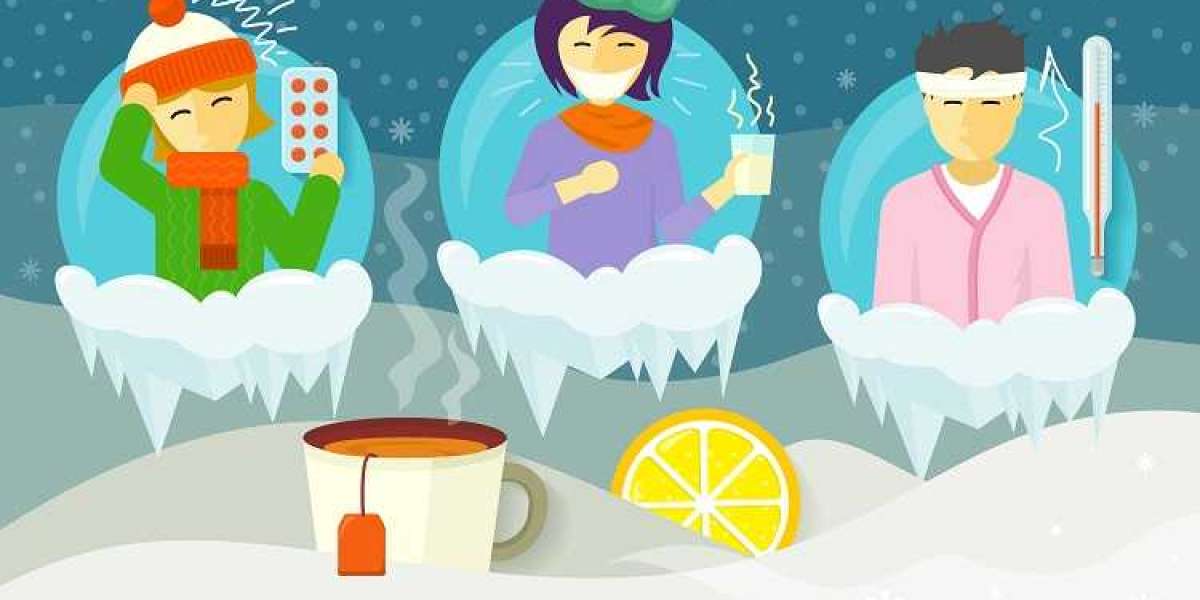Introduction
Winter, with its festive celebrations and cosy indoor moments, brings both joy and health challenges. To fully adopt the positive aspects of the season, individuals need to prioritize health and well-being. This article explores common winter health problems, their causes and symptoms, diagnostic tests, and offers ten practical tips to help individuals stay healthy during the colder months.
Common Winter Health Problems – Causes and their Symptoms
COMMON COLD -
Cause: Rhinoviruses thrive in winter due to reduced sunlight and vitamin D absorption.
Symptoms: Individuals may experience a runny or stuffy nose, sore throat, cough, sneezing, fever, malaise, body ache, and a mild headache.
FLU -
Cause: Closed environments without fresh air facilitate the spread of influenza viruses.
Symptoms: Common symptoms include fever, cold sweats, body aches, headache, exhaustion, and occasional gastrointestinal symptoms.
PNEUMONIA -
Cause: Bacterial, viral, and fungal infections block air sacs in the lungs.
Symptoms: Severe cough, green phlegm, high fever, shortness of breath, severe headache, diarrhoea, vomiting, profuse sweating, muscle pain, and purple skin.
SORE THROAT -
Cause: Viral infections, streptococcus bacteria, allergies, dust, dry air, air pollutants.
Symptoms: Individuals may experience severe throat pain, a swollen throat, red tonsils, and pus on tonsils.
ASTHMA ATTACKS -
Cause: Winter illnesses trigger asthma in those allergic to dust and pet dander.
Symptoms: Persistent coughing, gasping for air, wheezing, chest tightness, shortness of breath, and extreme fatigue.
HEART ATTACKS -
Cause: Cold weather increases tension in the hearts of individuals with high blood pressure.
Symptoms: Persistent chest pressure, severe pain in the neck, arms, jaw, back, and stomach, sudden shortness of breath, nausea, and light-headedness.
PAIN IN JOINTS -
Cause: Arthritis discomfort increases as synovial fluid thickens in cold weather.
Symptoms: Joint pain, limited range of movement, stiffness, swelling or tenderness, redness or warmth, difficulty in daily activities.
DRY AND ITCHY SKIN -
Cause: Reduced sweating leads to dry skin, acne, eczema, and insufficient oil production.
Symptoms: Rough-feeling skin, itching, flaking, scaling, fine lines, ashy skin, redness, deep cracks.
Diagnostic Tests
As winter sets in, prioritizing preventive health check-ups becomes important to address seasonal health concerns. Vitamin D deficiency, prevalent in winter, can be identified through a basic blood test named VITAMIN D 25 - hydroxy. In addition to this, assessing anaemia through a complete blood count (CBC) provides valuable insights into red blood cell health. Furthermore, thyroid function tests, screening for seasonal allergies, and evaluating Seasonal Affective Disorder contribute to a comprehensive health check-up.
How Can One Prevent and Maintain Health during the Winter Season?
Prepare for a healthy winter with these Top 10 Tips -
- Healthy Eating - Make sure to eat a balanced diet with lots of fruits, veggies, whole grains, lean proteins, and foods with vitamins C, D, and zinc. These keep the immune system strong, which is important during the winter.
- Stay Hydrated - Drink enough water every day and enjoy warm herbal teas, soups, and drinks to stay hydrated. It helps the body function well, especially when it is cold outside.
- Good Sleep Habits - Get 7-9 hours of good sleep each night. Have a regular bedtime routine and avoid using screens before bedtime for better sleep.
- Stay Active - Stay moving by doing indoor exercises, trying out winter sports, or doing activities like yoga and home workouts. It keeps the body in good shape and helps with seasonal affective disorder (SAD).
- Keep Clean - Wash hands often, use hand sanitizer, and avoid touching the face to stop germs from spreading. It is an easy way to stay healthy.
- Immune Boost - Talk to a doctor about vitamin supplements to strengthen the immune system, especially during the darker and colder months.
- Dress Warm - Wear the right clothes for the weather. Layer up and use hats, gloves, scarves, and waterproof shoes when needed. It helps to stay warm and comfortable outside.
- Handle Stress - Deal with stress and seasonal affective disorder by trying things like meditation, yoga, deep breathing, or doing things you enjoy.
- Stay Connected - Keep in touch with friends and family, either online or by following safety rules for in-person meetings. It helps to not feel lonely.
- Get Vaccinated - Consider discussing flu and other vaccinations with a medical expert. Getting vaccinated is a key preventive measure against illness, especially during the winter when the risk of getting sick is elevated.
Frequently Asked Questions
Q. Can winter chronic diseases be cured?
A. Yes, with suitable diagnosis and preventive measures, chronic illnesses in winter can be addressed effectively.
Q. Why should cardiac patients get tested before winter?
A. Testing before winter helps manage risks associated with increased blood pressure and cholesterol levels due to cold weather.
Q. What are essential health tips for winter?
A. Essential health tips for winter include maintaining a balanced diet, staying hydrated, getting adequate sleep, staying active with indoor exercises, practising good hygiene, and taking preventive measures against common winter illnesses. Regular health check-ups contribute to overall well-being during the season.
Prioritize well-being this season by scheduling a check-up with ease by visiting at https://www.lalpathlabs.com/book-a-test. Health matters—take the first step today!
References
- https://www.heterohealthcare.com/blog/common-winter-health-problems-and-how-to-prevent-them
- https://continentalhospitals.com/blog/top-10-tips-to-stay-healthy-during-the-winter-season/
- https://www.apollodiagnostics.in/blog/chronic-conditions-in-cold-weather-essential-tests-and-precautions








